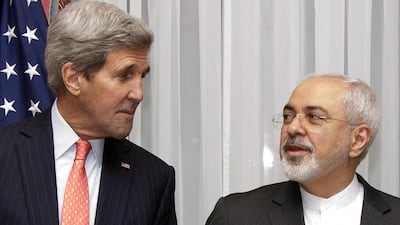When the Iran nuclear deal was agreed in July 2015, it was forged in a spirit of optimism and trust: that Tehran would not pursue the development of a nuclear weapon and that it would desist from its attempts to destabilise the region. While the Iranian regime has so far refrained from creating a nuclear warhead, it has actually stepped up its attempts to destabilise the Middle East. With every passing day, the flaws in the deal are becoming ever more stark. In Syria, Iraq, Lebanon and most catastrophically in Yemen, Iran has sought to advance its agenda of regional hegemony. With its funding and training of Hezbollah, it has attempted to blur the distinction between military and political. Saudi Arabia has been repeatedly bombarded with missiles, launched at civilian targets by Iran-backed Houthi rebels in Yemen, albeit intercepted. Via proxies, the regime has seized land in Iraq and Syria, bringing its empirical aspirations of a military corridor stretching from Tehran to Beirut ever closer. All this has been enacted under the noses of world powers, who attempt to placate the regime with sanctions relief and promises of upholding the deal in the face of repeated threats and aggression.
US President Donald Trump has been vocal in his criticism of Iran. His threats to withdraw from the ruinous deal before May 12 have sparked efforts from European leaders to save it, as well as reciprocal vows from the Iranian regime to "vigorously" resume nuclear enrichment. What is becoming increasingly clear is that the terms of the 2015 deal have not been stringent enough to curb Tehran's behaviour. This week Mr Trump and French President Emmanuel Macron discussed the possibility of a renegotiated deal. German Chancellor Angela Merkel will follow Mr Macron to Washington tomorrow.
The renegotiations must place front and centre the need for sanctions relief not to be misused to finance Tehran's extensive ballistic missile programme and regional violence and to instead alleviate the suffering of the Iranian people, who have been protesting for four months against dire living conditions. The flawed sunset clause, which liberates Tehran from the deal's requirements after a decade, must be rectified to hold the regime to account long-term. And any new deal must establish an international consensus on Iran's nefarious activities across the Middle East. As Mr Trump said: "No matter where you go in the Middle East, Iran is behind it." Buttressed by the Revolutionary Guard Corps, who regard the deal with contempt, Tehran is unquestionably the region's primary agitator. No deal at all would mean its activities going unmonitored and unchecked. An improved, conditional deal is vital for the safety of the region, and the world.

